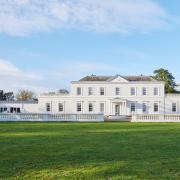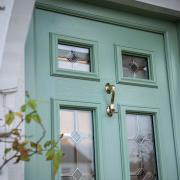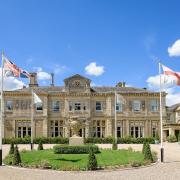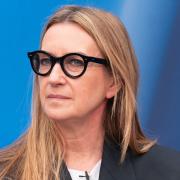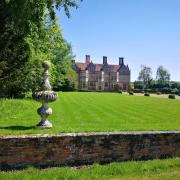To bee or not to bee, that’s the question on a lot of lips.
‘I think the growing public awareness of human impact on the environment and climate change is making people more considerate of their actions and what they can do to help,’ shares Mark Meadows, founder of Noochii Hives in Great Baddow. ‘Beekeeping is a way for people to contribute and make a difference. After a low of 9,000 in the early noughties, the number of registered UK beekeepers is growing, and we’re nearing 50,000 in total now.’
Mark started his company just over a year ago, which specialises in designing and making sustainable, beautiful beehives.
‘I was born in Zimbabwe where my grandfather was a beekeeper, so the activity’s been on my radar for as long as I can remember,’ he adds. ‘I arrived in the UK 23 years ago to study sports technology at Loughborough University and decided to stay after meeting and marrying a beautiful Essex girl. Despite my background with beekeeping, it wasn’t until my family bought me a hive for my 40th birthday that I was inspired to return to the hobby, where I discovered so much more and gained a true appreciation for these fascinating creatures. After keeping bees for a while, my design and engineering brain grew restless, and I began exploring hive design and the components a bee colony needs to thrive. Launching Noochii became the next logical step.’

Mark’s goal was to design a hive that would adapt to a colony’s needs throughout the year, could adjust to their varying numbers, which range from a few thousand bees in winter to 60,000 in summer and would be easy for beekeepers to use.
The name Noochii is derived from the Shona word ‘Nyuchi’ meaning honeybee. ‘As I grew up near Harare, Zimbabwe’s capital, I was a fluent Shona speaker, but it was my daughter who came up with the idea to use a Shona word for the business name – thanks, Lotte!’ Mark says. ‘After this many years, my speech was a little rusty, so I had to double check the meaning first but then realised it perfectly described what we were doing.’
When crafting his hives, Mark uses accoya, a modified timber which undergoes a process called acetylation, which preserves the wood in a similar way to how we pickle onions. It ensures the hives are protected against the elements and from insects, guaranteeing they’ll last for years to come, with minimal maintenance. 'Managing a colony of bees is fun, but it comes with some challenges,’ Mark shares. ‘I’ve had to learn a lot about bees to make hives. Being a hobbyist beekeeper certainly helped, and luckily for me, my parents manufacture outdoor furniture. I used to spend summers working in their factory, where I discovered a lot about woodwork. It ensured all bases were covered when it came to designing a hive that would help bees flourish and make beekeepers’ lives as simple as possible.’

Beekeepers play an essential role in helping to maintain and protect these important animals, which are crucial to our survival on this planet.
‘Bees are a keystone species,’ Mark reveals. ‘They, along with other pollinators, help approximately 80 per cent of the world’s flowering plants reproduce. It’s also estimated a third of all the food we consume is directly pollinated by bees. The reality is, however, that they are under threat from many things. The varroa mite is a parasite that can kill entire colonies if not treated. They arrived in the UK in the 90s and massively impacted the number of bee colonies in the country and just last year, a new predator arrived; the Asian hornet. This invasive species has spread across Europe and poses a very real danger to our bees, as do some pesticides used in farming, which can affect a bee’s ability to return to their hive.’
Helping to care for bees correctly can minimise their loss of life against such adversities.

‘There are quite a few beekeepers in Essex,’ Mark explains. ‘Most enjoy it as a hobby, keeping a couple of colonies in their garden, though there's a handful of commercial beekeepers with many hives on nearby farms who supply farmers' markets and shops with local honey. It’s also a favourite pastime of some well-known celebrities, including Jamie Oliver, David Beckham, Angelina Jolie and in the USA, actor Morgan Freeman has converted a 124-acre ranch into a bee reserve.’
David Beckham can be seen in the opening of Netflix docuseries ‘Beckham’ harvesting his apiary and in videos and photos across his social channels Jamie Oliver is often tending his hives and gathering honey for his recipes. Walking Dead actor Corey Brill also keeps bees on his rooftop. All three celebrities use Flow Hive models. Superstar Angelina Jolie has long been known for her connection with bees. You could even call her The Godmother, as that’s her role within the innovative entrepreneurship program, ‘Women for Bees.’ The organisation empowers women worldwide, training them as beekeepers and pollinator protectors. Learning these skills aids biodiversity conservation and can generate income in rural areas where farming is difficult. In 2021, Angelina Jolie struck a pose for National Geographic to highlight World Bee Day and spread news of the program’s important work.
Joining the A-list hive is Ed Sheeran, who’s believed to have installed a beehive at his Suffolk Estate and even the queen bee, Beyonce, is said to keep up to 80,000 bees at home. Other celebrities of note adding to the pollen count are Chris Hemsworth, Scarlett Johansson and Sting – what can we say other than it seems meant to bee! Jason Statham also joined the ranks of apiculture to prepare for his role in the action thriller ‘The Beekeeper’ which premiered on Sky Cinema earlier this year.

The hobby even earns the royal seal of approval. HM The Queen Camilla possesses a passion for protecting and keeping bees and produces honey from her Wiltshire home, which is then sold, and the funds donated to charity. She’s the president of Bees for Development (beesfordevelopment.org), an international charity committed to alleviating poverty through beekeeping. In 2022, their work with citrus farmers in Ghana helped support 10 communities through the country’s economic turmoil. Their beekeeping training provided an additional source of income, with individuals selling honey and beeswax, while also enriching their local environment. Over the last 31 years, the organisation has helped communities across the globe. They’ve been involved with various projects offering training in and spreading awareness of beekeeping and creating environmental champions. Their work supports livelihoods, sustainability, habitats and wildlife.
With all that in mind, perhaps it’s not so hard to imagine why people from all walks of life are embracing this rewarding and wholesome activity.

‘Beekeeping has been one of the best pursuits I’ve embarked upon,’ Mark comments. ‘Currently, I’ve got two bee colonies. One on a private allotment near Roxwell and another in my garden in Great Baddow, where I intend to add another hive in a couple of weeks. I love checking in with the bees daily to see how they’re getting on. I designed Noochii Hives with observation windows built into the walls which makes it possible to peer inside the hive and see the bees working on the honeycomb without the need for a bee suit. This week’s been dry and sunny, and the bees have been busy flying off and returning with plenty of pollen and nectar.
‘I highly recommend more people explore getting into beekeeping. I certainly understand why some may be apprehensive about keeping bees but it’s much easier than you might think. The best way to get started is to contact your local beekeeper’s association. For us in Essex, that would be ebka.org. They will help with training, offer advice about essential equipment, and explain where to get your bees and what to do once you have them. Or you can get in touch with me, and I’d be delighted to help!
‘Now that I understand more about how bee colonies work, it’s incredible to see them making amends as the seasons change and how they care for their queen. But above all, fresh, homegrown, honeycomb on warm toast is what it’s all about. I can’t deny it’s one of my absolute favourites!’ noochiihive.com

Beekeeper for a Day
Ready to dip a finger in the honeypot and find out how it’s made? The Natural Hive Co offers a morning with a beekeeper at Barleylands Farm Park, Billericay. Surrounded by tranquil farmland, uncover how equipment is used, discover the key stages in a bee season and learn how to spot worker bees from drones and a queen. Don’t forget to bring over-the-ankle boots/wellies and thick socks! Once suited and booted with protective gear, and looking the bee's knees, it’s time to get up close and personal with the bees and HRH the queen, to explore the inner workings of the hive. The experience lasts two and a half hours and can be booked online. Afterwards, sample their wonderful honey gathered at the apiary and dine on delightful snacks like the ploughman’s lunch platter. Visitors will also receive a small goodie bag and souvenir as thanks! It’s a bee-you-tiful day out! thenaturalhive.com/products/day-with-a-bee-keeper













